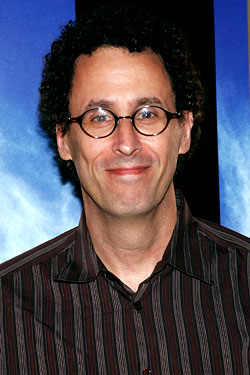
First things first. Where did the angel come from?
I had a dream, in 1985, I believe, when a friend I’d gone to school with was sick—one of the first people I knew who’d gotten the AIDS virus. I had a dream of him in his bedroom with an angel crashing through the ceiling. I wrote a poem called “Angels in America.” I’ve never looked at the poem since the day I wrote it.
And how did Mormonism enter into it?
There were these Mormon missionaries that I used to see at my subway stop, in Carroll Gardens, around 1983. One of them was, I thought, kind of hot. They were always there in the morning, in front of a bunch of people who could have cared less about the Book of Mormon. And I was kind of touched by that.
So you lived in Carroll Gardens while writing Angels but moved to Manhattan as soon as you could afford it?
537 Clinton Street, right near the BQE. The building was leaning to one side, and there were times I thought it might just fall over. I had been there for about twelve years. I wanted to be in Manhattan.
Do you miss Brooklyn at all?
I loved the neighborhood. I’m working on a new play that’s set in Brooklyn with an Italian-American family. Right after the play opened on Broadway, I was approached at the F-train station by somebody who had heard that Roy Cohn was a character, and he wanted to know if his grandfather was in the play. I said, “Who’s your grandfather?” He said, “Carlo Gambino.” And I said, “No, he’s not in the play.” And he said, “I’m really glad to hear that.” Then he told me stories about Roy Cohn getting him and his cousin into Studio 54. And the next day, I had a box of very nice Italian red wine sitting outside my front door.
You made Heaven look like San Francisco. So why was the play set in New York?
Who is it, Baudrillard? One of those French guys said New York is the city of the Apocalypse. It has a kind of real and unreal feeling. It’s also a city of towers, it points upward, so obviously it has this feeling of vision, of a hallucination almost.
After the first part, Millennium Approaches, won the Pulitzer and the Tony, you had a very hard time revising part two, Perestroika, in time for the next season.
It was horrible. I gained another twenty pounds—I think I was about 250 or 260 at that point. Every day, when I sat down to write—I’m not kidding—a box of Entenmann’s chocolate-chip cookies and a gallon of Coke. I wasn’t on any antidepressants, so that was my drug. I would get one or two scenes written and basically black out from sugar.
They had to delay the opening. What happened?
I had a fantasy that I could make Perestroika into what the first part is—a pretty tightly constructed entertainment. And [Perestroika] never should have been that; it always should have been its big messy self. There was a real fear that Perestroika would be the undoing of Millennium.
You must have driven everyone nuts. Do you feel bad about that?
I feel bad about everything. But it’s the way that I write, and something usually emerges that I don’t know I would have gotten [otherwise].
And did you get something out of it?
When we started rehearsals for the first draft, I hadn’t written what I think may be the best scene in the play—we call it the “Negro Nightmare” scene, between Belize [the nurse] and Roy Cohn. I’d remembered a dream I had after my grandfather died. He was angry at me about being gay, and then this black man showed up and said, “I am the Black Other.” So I wrote it after we started rehearsals, and I brought it in to [director George C. Wolfe] and said, “I don’t know, it’s pretty weird.” And we read it and George said, “You’re not touching a word of that.”
Why do you think Angels got such a huge reaction?
I got really lucky. One of the things that was unique about the play was that it was so openly and explicitly political, that the jokes were specifically about Ronald Reagan. There was a sense that you shouldn’t write about specifics, because that will date very quickly. But I couldn’t figure out a way to have modern American people talk about politics without being specific. Also, it was the end of the Reagan era—we thought—and the beginning of the Clinton era. That combination of rage and grief and optimism is a combination that the play reflects pretty effectively.
